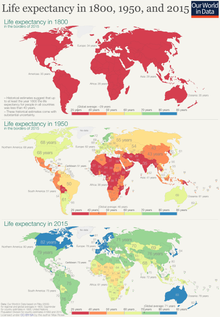Our World in Data
|
|
|
|---|---|
| Online publication | |
| languages | English |
| editorial staff | Max Roser (founder & director), others |
| Registration | No |
| On-line | 2011 (currently online) |
| https://ourworldindata.org/ | |
Our World in Data ( OWID ) is an online publication that provides information on the historical development of the living conditions of mankind. To this end, it considers demographic , economic development , geographic and cultural aspects , among other things . Our World in Data often takes a historical perspective and provides information on the historical development of the living conditions of mankind.
OWID is divided into problem areas. Each article discusses a global problem - from health problems to hunger, poverty, war, education, to environmental issues. Depending on the completeness of the entry, these represent the historical development of an aspect, the causes and consequences of this development, as well as the quality of the underlying data. All topics are also presented graphically. The contributions are licensed under CC-SA 4.0 .
Organizational matters
Our World in Data is based at Oxford Martin School, part of Oxford University's social science faculty .
The head is the economist Max Roser . In addition to donations from private individuals, the site has been funded by the Nuffield Foundation in the past and is currently funded by the Bill & Melinda Gates Foundation .
history
Roser started working on Our World in Data in 2011. In the first few years he financed his project as a bicycle tour guide in Europe and developed the publication together with the inequality researcher Sir Tony Atkinson .
In 2014 the publication reached 120,000 readers. Since then, the number of readers rose to over 25 million between December 2018 and December 2019.
In 2019, Our World in Data received the Lovie Award, the European internet prize. The laudation says Our World in Data provides a perspective that is "necessary to bring about social, economic and ecological changes".
use
Our World in Data is cited in scientific journals such as Science , Nature, and the Proceedings of the National Academy of Sciences .
The website is widely used as a data source in the media. English-language media in particular, such as the BBC , the Washington Post , the New York Times and The Economist , regularly rely on Our World in Data as a source.
Our World in Data is used in teaching at universities. Institutions that use this online publication for their teaching include Harvard University , Stanford University , the University of Oxford , the University of Chicago , and the University of Cambridge .
Web links
Individual evidence
- ↑ a b About. In: Our World in Data. Retrieved December 18, 2019 .
- ^ History of Our World in Data. Retrieved December 18, 2019 .
- ↑ How many visitors ourworldindata.org got in the last 12 months. Retrieved December 18, 2019 .
- ↑ Meet The 2019 Lovie Awards Special Achievement Winners. In: The Lovie Awards. October 7, 2019, Retrieved December 18, 2019 (American English).
- ↑ Ruth DeFries, Harini Nagendra: Ecosystem management as a wicked problem . In: Science . tape 356 , no. 6335 , April 21, 2017, ISSN 0036-8075 , p. 265–270 , doi : 10.1126 / science.aal1950 , PMID 28428392 ( online [accessed December 18, 2019]).
- ↑ Eric J. Topol: High-performance medicine: the convergence of human and artificial intelligence . In: Nature Medicine . tape 25 , no. 1 , January 2019, ISSN 1546-170X , p. 44–56 , doi : 10.1038 / s41591-018-0300-7 ( online [accessed December 18, 2019]).
- ↑ Michael Levitt, Jonathan M. Levitt: Future of fundamental discovery in US biomedical research . In: Proceedings of the National Academy of Sciences of the United States of America . tape 114 , no. 25 , June 20, 2017, ISSN 0027-8424 , p. 6498-6503 , doi : 10.1073 / pnas.1609996114 , PMID 28584129 , PMC 5488913 (free full text).
- ↑ Our Audience & Coverage - Our World in Data. December 9, 2019, accessed December 18, 2019 .
- ↑ Our World in Data for teaching - what we are learning from your feedback. Retrieved December 18, 2019 .
